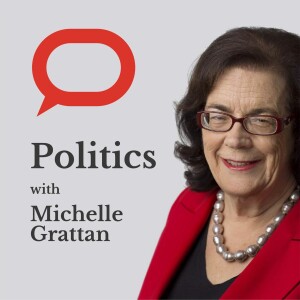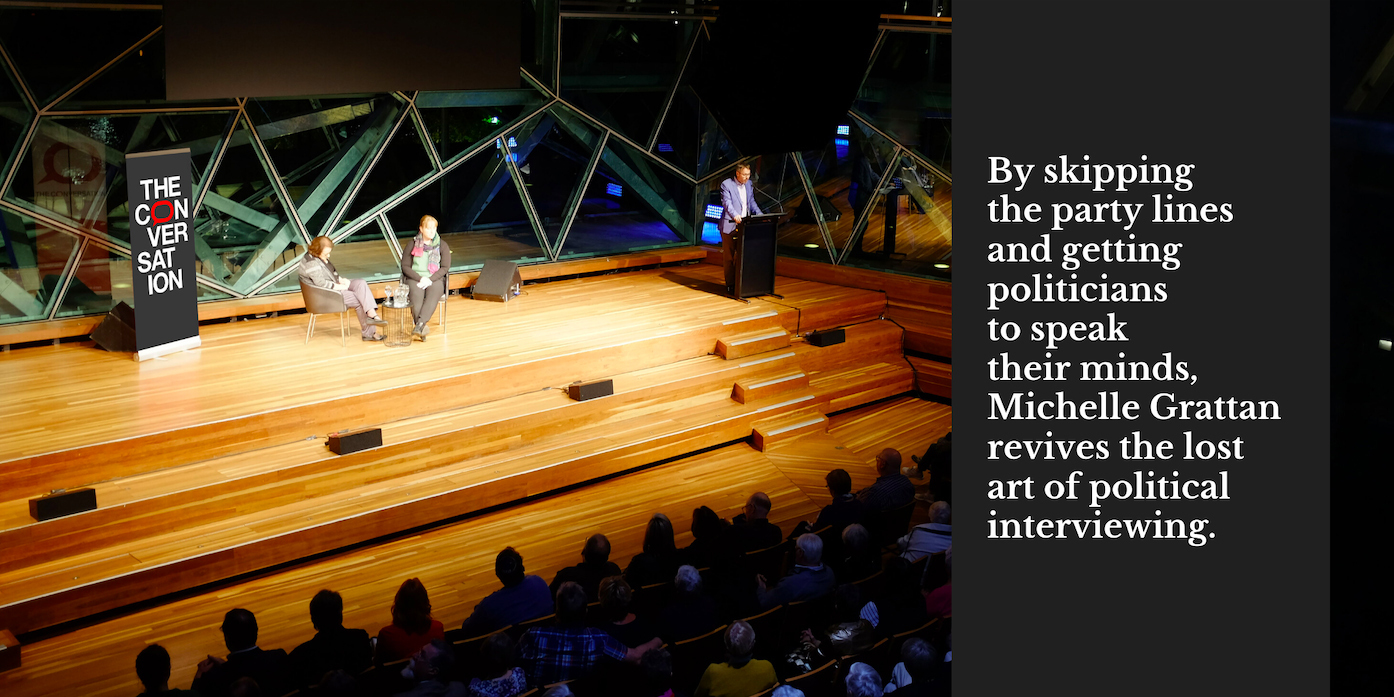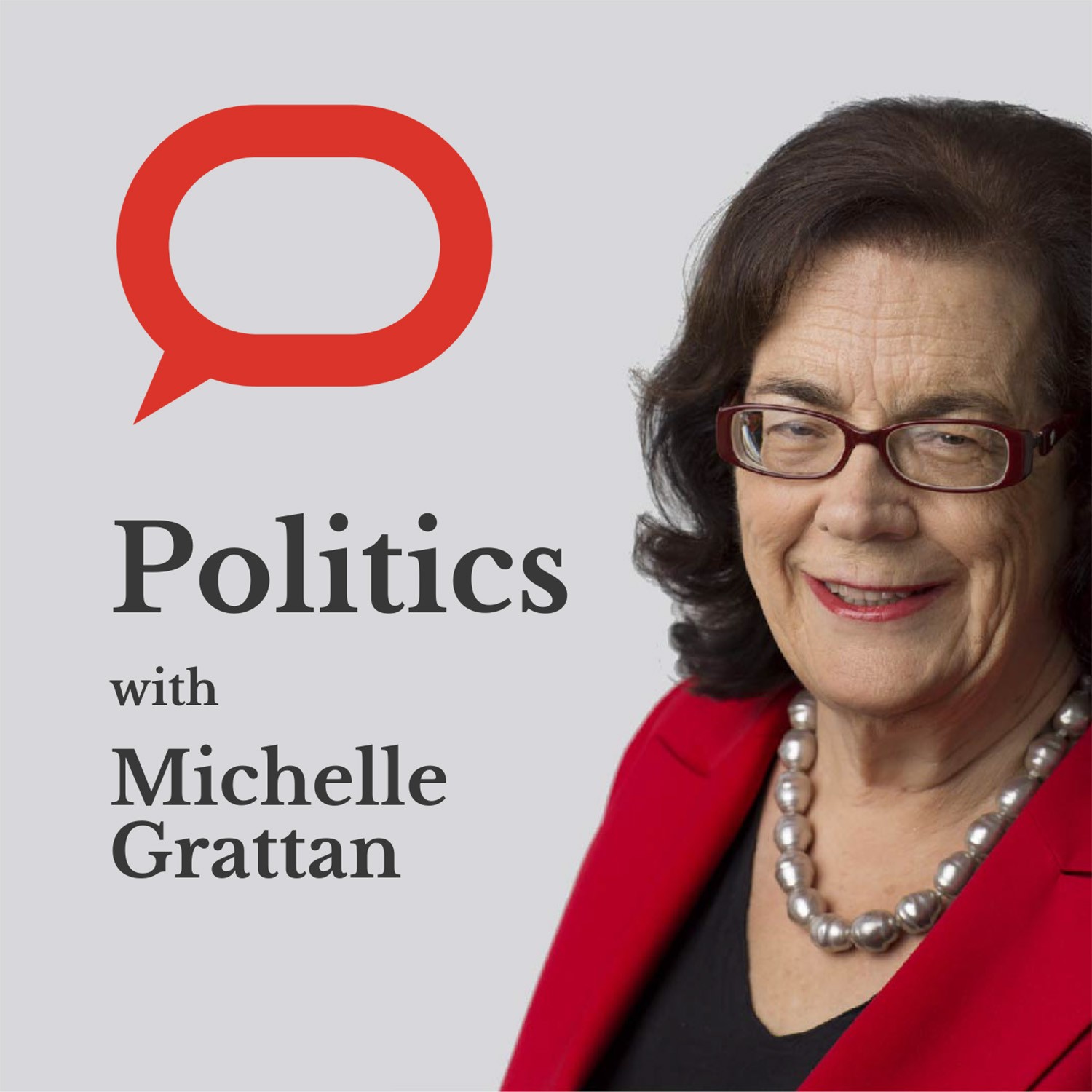Episodes

Thursday May 19, 2022
Historian Frank Bongiorno reflects on elections present and past
Thursday May 19, 2022
Thursday May 19, 2022
Every election is unique, but each also presents comparisons and contrasts with elections past.
In this podcast, Australian National University history professor Frank Bongiorno gives his insights into the current battle but also takes the long views of campaigns.
Bongiorno talks about the role of leaders in what’s often dubbed the “presidential” election age (“a kind of proxy for judgements about policy”) and how Scott Morrison and Anthony Albanese are presenting themselves.
The debate on wages and inflation has overtones of the arguments in the 1970s and 1980s, but “sort of minus the policy”.
This was supposed to be a “khaki” election, but the khaki has faded during the campaign, perhaps unsurprisingly. Most often, Australians are solidly focused on domestic issues when they vote.
The “teals” have been a special feature of this campaign. But are they a new version of other breakaways, like the Australian Democrats of old?
The rise of voter disillusionment is a feature of recent elections, as is the detachment of voters from the major parties. Not so long ago, about seven in ten voters voted at each election the same way as they had voted throughout their lives, Bongiorno says, based on the ANU’s Australian Election Study. But now it is just under four in ten. “That means there’s a growing number of voters whose support is biddable, and the independents and minor parties are benefiting from that kind of loosening of the hold of the major parties over the voters.”

Tuesday May 17, 2022
Five seats to watch on Saturday night, and getting the hang of a hung parliament
Tuesday May 17, 2022
Tuesday May 17, 2022
As well as her interviews with politicians and experts, Politics with Michelle Grattan includes “Word from The Hill”, where she discusses the news with members of The Conversation politics team.
In this podcast Michelle and politics + society editor Amanda Dunn canvass the Coalition’s “super” housing pitch, five seats to eyeball on Saturday night, and what would happen if the parliamentary numbers were “hung”.

Wednesday May 11, 2022
Wednesday May 11, 2022
Danielle Wood is the CEO of the Grattan Institute, an independent think tank, Its purpose is to research and advocate policies to improve Australians’ lives.
Wood laments the dearth of policy debate in this election.
“There was a lot of optimism when we were coming out of COVID that this might be a period of genuine policy reform. It certainly was a period that laid bare a lot of challenges. We saw trust in government go up and there was a lot of talk of building back better in the sense that government might do some of those big things. But clearly, that’s not the election we’re in right now,” she says.
“We are now in a world where we’ve come out of COVID with government much bigger than what we went in. So we’ve baked in this higher spending on aged care, higher spending on defence, a higher spending on the NDIS.
"In fact, size of governments increase about 2% of GDP, which is pretty extraordinary. Yet we’ve had no conversation about how we pay for that.”
Climate change is to the fore in the minds of many economists as well as voters, and a central feature of “teal” candidates’ campaigns. But the government and Labor are not talking about it a great deal in the campaign.
“I think it’s really interesting to see economists so galvanised by that. We need to get on the path to net zero by 2050. Both major parties have signed on to that as a target. That is a massive economic transition. And frankly, if we don’t start making serious headway over the next decade, we’re going to leave ourselves with a very large and very disruptive task through the 2030s and forties.”
Anthony Albanese this week found himself under attack after advocating a 5.1% rise (reflecting the latest inflation figure) in the minimum wage. Wood says: “Locking in very high wage rises right now is not the right answer. But that’s not to say that wages growing at 2% is a good answer either. So it’s somewhere in between.”
Australia needs to increase productivity, but where should the focus be? “I would like to see a focus on education. There are things we can do in health as well, such as primary care reform, which could make a big difference […] And remember, that’s a big area in the economy and spending.”
Should we be more worried than we are about Australia’s debt level? “I’m not worried about the current levels of debt in terms of sustainability. Obviously we’ve come out of COVID with much higher debt levels than we went in with. But based on at least the current interest profile, it’s very serviceable and sustainable.”

Wednesday May 11, 2022
Scott Morrison defends Katherine Deves (again), but slips up on surgery detail
Wednesday May 11, 2022
Wednesday May 11, 2022
As well as her interviews with politicians and experts, Politics with Michelle Grattan includes “Word from The Hill”, where she discusses the news with members of The Conversation politics team.
In this podcast Michelle and politics + society editor Amanda Dunn canvass how the interest rate rise has played against the government, Scott Morrison defending Katherine Deves (again), the major parties’ keeping the climate change issue low key, “gotcha” questions, and the coming Liberal launch.

Thursday May 05, 2022
Dave Sharma, Allegra Spender, and Kerryn Phelps on the contest for Wentworth
Thursday May 05, 2022
Thursday May 05, 2022
In the Wentworth Project, sponsored by the University of Canberra’s Centre for Change Governance and The Conversation, we are tapping into voters’ opinions in this seat, which appears to be on a knife edge.
In this podcast we talk with the two main candidates, Liberal incumbent Dave Sharma and “teal” independent Allegra Spender, as well as with Kerryn Phelps, the former independent member in the seat, who has mentored Spender and is on the advisory council of Climate 200, which is donating to her campaign.
Sharma says “Kerryn Phelps was a genuine independent candidate or a more traditional independent candidate. […] This independent candidate is really sort of a franchise or party operation.”
Sharma casts the teals, who are challenging Liberals in a range of city seats, as reflecting “populism as a political force”.
“People think populism only belongs to the right because of Donald Trump. I think the independents are basically harnessing a populist mood, which is similar to what Donald Trump did, which is ‘a curse on all your houses.’”
Morrison is not campaigning in the teal seats (though he goes to Wentworth to visit his mother). Asked how much the Prime Minister is a drag on the vote, Sharma stresses the team. “Scott Morrison is the leader of our team and the spokesperson for the team. But it’s also got a range of ministers in there who control different portfolios and we’re putting ourselves forward, and I certainly am here, as a team.”
Spender says “there’s a feeling amongst the community that I hear, that they feel that the parties are looking after themselves first and the community after”.
On a possible hung parliament, she says, “I would be willing to work with either party, or major party on supply and confidence, because I want stable government”. She would talk first to whichever side had the greatest number of seats.
Wentworth is seeing enormous spending. Spender says her campaign will probably spend between $1.3 and $1.5 million (with something under 30% expected to come from Climate 200).
She favours caps on spending and donations. “I’d like to see a cap in what individuals or companies can give. I’d like to see real time information in terms of what has been given. And then I think at the same time, you need to look at political advertising and how that is used because the government just spent $30 million spruiking their clean energy credentials […] immediately before the election being called.”
Kerryn Phelps says of Wentworth: “I’ve had a medical practise in Double Bay for around two decades, and so I know the community well. It’s generally seen as an affluent community, but it’s actually quite diverse. There are clearly strong beliefs about the economy and business. And so a candidate would need to have business experience. But the people also have a very strong social conscience. They’re very environmentally aware. And I think that’s particularly highlighted by the fact that it’s bounded by the harbour and the ocean.”

Tuesday May 03, 2022
Tuesday May 03, 2022
As well as her interviews with politicians and experts, Politics with Michelle Grattan includes “Word from The Hill”, where she discusses the news with members of The Conversation politics team.
In this podcast Michelle and politics + society editor Amanda Dunn canvass the Reserve Bank’s increase in interest rates, and which side wins or loses from it, as cost of living is centre stage in the election battle. They also discuss Anthony Albanese’s launch, and the implications for the Liberals if Josh Frydenberg were to lose in Kooyong.

Wednesday Apr 27, 2022
Economist Saul Eslake on why Reserve Bank needs to raise rates next week
Wednesday Apr 27, 2022
Wednesday Apr 27, 2022
After Wednesday’s larger-than-expected inflation number, all attention has turned to the Reserve Bank’s meeting on Tuesday. If the bank moves next week, it will be the first time there’s been a rise in a campaign since 2007, the election John Howard lost.
Pointing to recent rate rises overseas, independent economist Saul Eslake says: “If the Reserve Bank were to do nothing in the face of this much sharper-than-expected acceleration in inflation, it would be leaving itself open to a charge of acting in a political way, which would undermine its credibility for an extended period.
"So I think the Reserve Bank really has to raise interest rates at its meeting next week.” If it doesn’t, Governor Philip Lowe would require “a very persuasive explanation”.
If the bank didn’t act next week, it could subsequently have to make a 75 basis points rise in one hit, “which would be a considerable shock to the mortgage-paying population in particular, but I think for small businesses and a whole lot of other participants in Australia’s economy more broadly.”

Wednesday Apr 27, 2022
Wednesday Apr 27, 2022
As well as her interviews with politicians and experts, Politics with Michelle Grattan includes “Word from The Hill”, where she discusses the news with members of The Conversation politics team.
In this podcast Michelle and politics + society editor Amanda Dunn canvass the latest (static) polls, apparently unaffected by Anthony Albanese’s COVID absence, or indeed by much else in the campaign so far.
They also discuss shock jock Ray Hadley’s extraordinary shouty assault on Albanese, how the very serious issue of the Solomons-China security pact is playing into the campaign, and whether controversial Liberal candidate Katherine Deves is really all about seats other than Warringah, the one she is contesting.

Wednesday Apr 20, 2022
Wednesday Apr 20, 2022
Andrew Wilkie, MP for the Tasmanian seat of Clark, has “lived” a hung parliament. In 2010, Wilkie did a formal “deal” to support Julia Gillard. When later she didn’t deliver on his key issue of gambling reform, he broke it off.
In this podcast Wilkie explains how he would approach the situation if the election produces no clear winner. No deals. But maybe a letter on giving confidence and supply.
He suggests independent candidates – who are being assailed with questions about which side they would support in a hung parliament – should contact him for a chat about how to approach that situation, and the role of crossbenchers generally.
“If they give me a call and ask what I think, I’ll tell them how I’ve navigated my way through the last 12 years and what my community has thought of it,” he says.
“I’ve explained how I’m going to approach things, and it’s always been well received by my community. In fact, my primary vote and two-party preferred has increased in every election. So whatever formulation I’m using seems to work.
"It might be something that some of these new independent candidates might want to just observe and think about. I think it is useful to give some indication of your thought processes,” Wilkie says.
“I see my role as being a constructive one. It’s to ensure we have an effective government for the next three years. My job isn’t to pull down any party or pull down any government. So if the Australian community elects a group of people and no party has an absolute majority, I will look for ways to be constructive.”
Wilkie strongly defends the role of crossbenchers, rejecting Scott Morrison’s argument that a hung parliament would make for instability. Their role can be useful even when there is majority government, Wilkie says.
He concedes that when crossbenchers are in a position of power – as under Gillard – their electorates get favoured treatment and that this isn’t “fair” (although he admits he was happy to seek and take the funds).
He recalls favourably Anthony Albanese’s performance as manager of government business in the Gillard government. “I credit him with being very skilled and effective at corralling the crossbench and ensuring stability of the parliament.”
“If Anthony Albanese finds himself negotiating with the crossbench, he’s got form. And I suppose I can probably say the same about Scott Morrison over the last few years, because he’s been almost in minority for most of it, and he’s managed to keep what I’ll call the independent crossbenchers pretty much in line.”
As for the election campaigning, “In my opinion, this is the worst campaign I’ve observed as far as the mudslinging and the dishonesty. I mean, there used to be some limits on the dishonesty of the political parties in the candidates, but there seem to be no limits at this election.”

Wednesday Apr 13, 2022
Joe Hockey on Trump, Biden, and the federal election
Wednesday Apr 13, 2022
Wednesday Apr 13, 2022
In this episode, Michelle Grattan speaks with Joe Hockey about his newly-released memoir titled Diplomatic.
Hockey, treasurer in the Abbott government and former Australian ambassador to the United States, picked early that Donald Trump had a good prospect of becoming president and reached out to his team, something that went down badly at the time with the foreign affairs bureaucracy back in Canberra.
But Hockey says: "Diplomacy is just about human relations. It's countries dealing on the same basis with each other as human beings. So you're never going to get on well with someone you don't know. You're actually going to have to engage."
Of Trump's successor, Hockey says: "I think Joe Biden has aged quite a bit in the presidency. He's only been president for just over a year. He's really shown he hasn't had the energy that you would expect of someone as president of the United States."
Also, "he's run a very left wing agenda, and that's completely stunned – completely stunned – middle America, because they thought he was a safe, middle-of-the-road sort of person.
"America is just not tuned into that. They're not buying that."
Speaking about the differences between US and Australian politics, Hockey highlights the significance of compulsory voting in this country. "I think the challenge in the United States is, you know, firstly, you try and get your own people to vote. And the more extreme you are, the more you villainise, and radicalise your opponents. It's easier to get people to come out and vote for you if they're against something.
"We don't have that battle for the extremes, and I think that's really, really important," he says.
"The political ads and what people say about each other in the United States has no filter, has no boundaries. And as a result, it becomes more fractious, becomes much more aggressive. And I think it's really, really important that proper defamation laws [exist] that allow someone to go in and protect their reputation so that people cannot make ridiculous, false accusations against others."
And Hockey's prediction for May 21? "I think it's just too close to call, really. I genuinely feel that both parties have a pathway to victory. And then, as so often the case, as events unfold during the campaign, we'll get a clearer picture of which way [...] the events are breaking."

